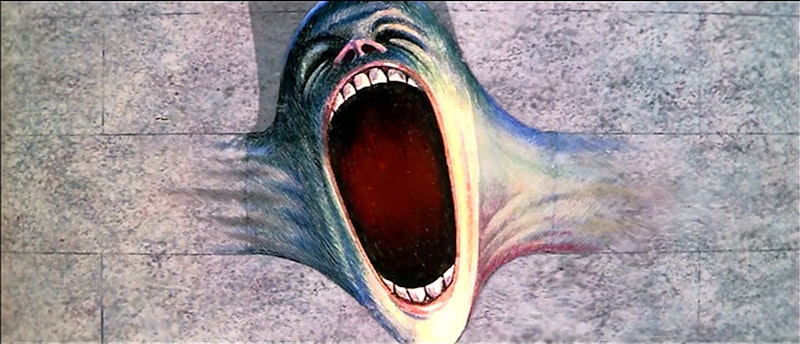I hated The Wall when I first listened to it. The sound effects, mad laughter, and creepy Gerald Scarfe cartoon characters inside the gatefold sleeve were too much for my 12-year-old mind. I gave the album a second chance in high school, and it instantly became an alltime favorite. I finally understood what Pink Floyd was trying to say. Roger Waters often says in interviews that The Wall is about the walls we all build around us, and my own wall is no different.
Like Pink, the protagonist of The Wall, my wall started in childhood. My dad bailed out when I was 10 months old because, as he wrote in a goodbye letter to my mom, being a husband and father wasn’t fun anymore. I only saw my dad sporadically throughout childhood, with time gaps growing between each visit. Whenever I asked my mom why they split up, she’d mumble, “It just didn’t work out” and left it at that. It wasn’t until I was a teenager when she told me he was more interested in partying like a rock star than raising his own flesh and blood. By that time, my wall was building.
Autism made socializing with other children difficult—I preferred playing alongside them than with them—but getting bullied nearly every day from first grade to high school graduation didn’t help. It was always the same routine. Either one kid or a group would gang up on me and start throwing taunts and slurs. I;d tell them to stop, but they persisted, waiting for me to react. Finally I’d explode in rage, scream at the top of my lungs, and hit myself in the head repeatedly because I couldn’t think of anything else to do. The entire classroom would laugh, and the bullies smiled. They wanted a show and I gave it to them. Between my deadbeat dad and the bullies, I had enough reasons not to let anyone get close to me.
There have been a few times when I thought it was safe to slowly dismantle the wall, but then something would happen—a failed relationship, for example—and it’d quickly go back up again. Now I live a solitary life where I only get out of the house to either run errands, see my psychiatrist/addiction specialist, see my therapist, or attend an AA meeting. I’m so used to it that even the mere act of texting, “Hey, how are you?” to a friend makes my arms tremble and breathing speed up. Why disrupt my safe and predictable daily routine for something trivial as socialization? Besides, no one can hurt me behind my wall.
That’s not entirely true. Other people might not be able to hurt me, but the worms eating into my brain can. The more time I spend isolated, the more paranoid delusions take over. I start believing that the Intellectual Dark Web is organizing a Twitter hate campaign against me, even though they don’t know who I am. Perception becomes more fractured as fantasy and reality become one. Meanwhile, words from the old bullies play through my head in a never-ending tape loop. “Is there anybody out there?” That’s when I force myself to reach out from behind the wall.
I did have lunch last weekend with my old friend Sydney, a fellow progressive trans person living in Maryland’s conservative Eastern Shore region. We hadn’t seen each other in two years, mostly because of my reluctance to socialize. But we had a good time eating cheap and shitty burritos at Taco Bell and catching up. As we hugged goodbye and went on with our day, I wondered if maybe it’s safe for me to slowly dismantle my wall.

